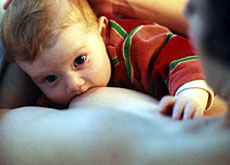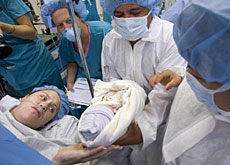Almost one in ten babies is born prematurely

In Switzerland almost ten per cent of babies are born early, one of the highest rates in Europe, according to a study published on Monday.
Experts say that in general more premature infants are being born in industrialised countries. Older mothers and more multiple births are said to be contributory factors.
The Federal Statistics Office figures for Switzerland show that in 2004, 90 per cent of the 72,125 hospital births were full term. Pre-term births accounted for nine per cent and one per cent were late.
For multiple births, which account for 3.5 per cent of infants and of which 97 per cent are twins, pre-term births rose to 61 per cent, with 39 per cent full term.
Switzerland’s figure of nine per cent of births before the 37th week gives it the second highest rate in Europe after Austria, according to the statistics office.
Babies born at term weighed on average 3.372kg and were 49.6 centimetres long. Those born early were on average 2.5kg and 45.7cm.
Hans Ulrich Bucher, professor of neonatology at Zurich University Hospital and president of Swiss Society of Neonatology, said that it was not known why there was such a high rate in Switzerland in particular. But he said that the rate was generally high in all industrialised countries.
Older mothers
One reason for this was that women now tended to give birth later.
“Older age [for birth] means more complications, more diabetes, pre-eclampsia and more problems in pregnancy. It has a higher pre-term rate,” Bucher told swissinfo.
Another explanation was the fact there have been more multiple births, which are often pre-term, Bucher said. Around two-thirds of twins are born early.
“The rate of multiple births has increased in the last years but for the past five years or so it has been stable in Switzerland, so the increase was beforehand, but nevertheless it’s a strong contributor to pre-term birth,” said Bucher.
Although it is not yet possible to say for sure whether there is a trend towards early births in Switzerland – statistics have only been collected since 2004 – figures for other western countries show that the trend towards premature births is increasing.
Only the United States has a higher rate, at 11 per cent, but this is mainly to do with faults in its health system, said Bucher. However, he remains concerned about the number of premature births.
Prognosis
“The prognosis of pre-terms is a little bit worse than of term infants, especially in that they have more problems in adaptation, they need more health resources and so it’s an economic question and it’s also a factor for society,” he explained.
Bucher said he was surprised about the development towards early births.
“For me the astonishing thing is that although obstetrics has made advances in tocolysis, in stopping premature labour, this obviously seems not to be effective,” he said.
The professor also mentioned the trend towards caesarean sections as also possibly contributing to the higher pre-term rate. These tended to be used if there were any abnormalities.
According to the statistics, most births were without complications, with problems only in 2.8 per cent of cases. The most common occurrences were heart or kidney-related complaints.
The time of birth was largely influenced by medical practices. There were fewer births at the weekend and more between 8 and 9am. These figures were influenced by the number of elective caesareans, noted the statistics office.
swissinfo, Isobel Leybold-Johnson
The birth rate designates the average number of children per woman. In Switzerland, it stands at 1.42. This places Switzerland in the middle of the table for Europe.
The countries with the highest birth rates tend to be developing countries such as Mali (7.38), Niger (7.37) and Uganda (6.84).
Among the developed countries, the US (2.09), France (1.98) and Iceland (1.91) have relatively high rates. Italy and Spain (both 1.29) and Lithuania (1.21) have low rates.
Worldwide the lowest rates are in China (1.12) and Singapore (1.07).

In compliance with the JTI standards
More: SWI swissinfo.ch certified by the Journalism Trust Initiative



You can find an overview of ongoing debates with our journalists here. Please join us!
If you want to start a conversation about a topic raised in this article or want to report factual errors, email us at english@swissinfo.ch.